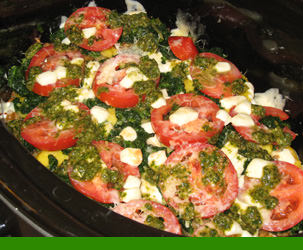Vata Pacifying Diet


|
Vata is the moving, quickly changing dosha and it adapts quickly to positive changes in diet. You’ll notice that your energy level is steadier and that eating Vata settling foods helps you to feel more happy and calm.
Because Vata is cold and dry, warm, moderately heavy and well-cooked foods are best for Vata types. A diet including relatively high-fat foods such as olive oil and clarified butter (ghee) is recommended. Cool, light, low calorie foods will increase Vata so salads and raw vegeta bles should be taken sparingly and with an oily dressing. These guidelines are especially helpful during cold, dry winter weather.
Generous portions, a nourishing breakfast and heavy, sweet foods such as milk, pasta, bread and rice help balance the light quality of Vata. Regular mealtimes in a quiet, settled environment are important.
|
|

|
Be sure to drink plenty of warm or hot liquids and avoid ice-cold and carbonated drinks which aggravate Vata.
Vata types often need an energy boost late in the afternoon. Hot herbal tea and cookies can bridge the gap and a special herbal tea formulated to balance Vata is available. To ensure you include all six tastes in your diet, you can use the Maharishi Ayurveda Vata herbal seasoning.
| Favour the following foods |
| General |
Sufficient quantity, unctuous (slightly oily), warm foods and drinks. Sweet sour and salty tastes |
| Grains |
Wheat products, rice (whole rice is best), cooked oat flakes in small amounts |
| Beans, dhal |
Yellow mung dahl (green skin removed) |
| Vegetables |
Root vegetables such as carrot, beetroot, sweet potatoes with ghee , butter or oil, zucchini, artichokes, asparagus, tender eggplant, tomato, cucumber, tender radish, green papaya, okra (lady fingers) and spinach in small amounts |
| Dairy |
All dairy products. Cheese should be soft and fresh |
| Sweeteners |
All sugar cane products. Honey in small amounts |
| Oils |
All |
| Nuts, seeds |
All except peanuts. Seeds in small amounts |
| Spices, condiments |
Cumin, ginger, mustard seeds, fenugreek, hing (asafoetida), cinnamon, cardamom, cloves, anis, fennel, black pepper (small amounts), salt, lemon juice, tamarind. All others in small amounts |
| Fruits |
Ripe, sweet and juicy fruits. Dried fruit is better soaked. Sweet grapes, pomegranate (sweet and sour), mango, papaya, sweet pineapple, banana, avocado, sweet and juicy apples and pears, sweet oranges, melons, plums, cherries, raisins, dates, prunes, figs, kiwifruit, peach, apricot |
| Avoid or Reduce the following foods |
| General |
Light and dry food. Cold food and drinks. Pungent, bitter & astringent tastes |
| Grains |
Barley, millet, corn, buckwheat, rye, raw oats |
| Beans, dhal |
All except yellow mung beans and red lentils |
| Vegetables |
Green leafy vegetables, orange pumpkin and squash, peas, potato, sprouts, mature eggplant and radish, broccoli, cauliflower, cabbage, celery |
| Fruits |
Unripe, dry, sour fruits. Guava, jambo, cashew, cranberries, persimmon (dried), chicory |
Note Regarding Vegetarian Diet
It is not necessary to be a vegetarian in order to enjoy benefits from Ayurveda, although a vegetarian diet is considered to be the most healthy. Ayurveda also includes knowledge of which meats are most suitable for which types of individuals. In the treatment of many diseases, however, a vegetarian diet or moderation in the quantity of meat consumed may be recommended.
Modern medical research has also begun to find significant evidence that a properly balanced vegetarian diet may be the most healthy diet. For example research has shown that the incidence of colonic cancer and certain other cancers is lower in individuals following a vegetarian diet. In addition, the incidence of obesity, which is a major risk factor in many diseases including gall bladder disease, hypertension and adult onset diabetes, has been found to be lower in those following a vegetarian diet. Also those taking less meat in their diet have been found to have fewer problems with cholesterol, a major risk factor in the development of cardiovascular disease.
Our diet is very important for our health. According to the American Cancer Society, up to 35% of the 900,000 new cases of cancer each year in the United States could be prevented by following proper dietary recommendations. Whatever diet has been recommended for use, please follow it in an easy and comfortable way. If you are currently eating meat on a regular basis, start by reducing the number of meals in which you include red meat (beef, pork, veal etc.) and substituting poultry and fish during these meals. Over a period of time, you will find that you are able to take less poultry and dish without creating strain on the physiology. If your diet becomes uncomfortable to you, please discuss it with your consultant.
Every-day herbals for Vatas




